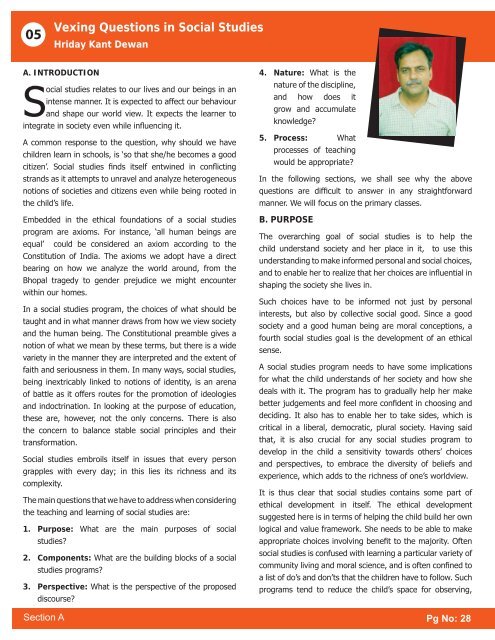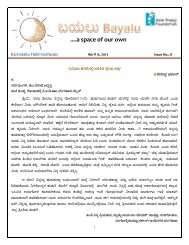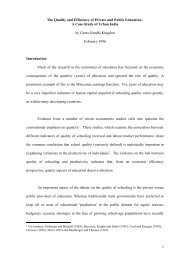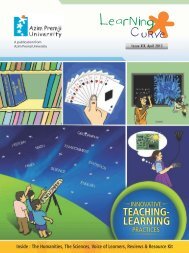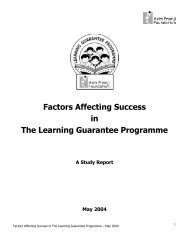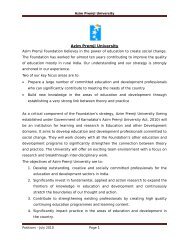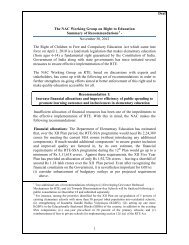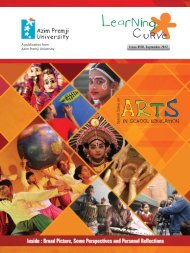Indesign Pagesnew.indd - Azim Premji Foundation
Indesign Pagesnew.indd - Azim Premji Foundation
Indesign Pagesnew.indd - Azim Premji Foundation
Create successful ePaper yourself
Turn your PDF publications into a flip-book with our unique Google optimized e-Paper software.
05<br />
Section A<br />
Vexing Questions in Social Studies<br />
Hriday Kant Dewan<br />
A. INTRODUCTION<br />
Social studies relates to our lives and our beings in an<br />
intense manner. It is expected to affect our behaviour<br />
and shape our world view. It expects the learner to<br />
integrate in society even while infl uencing it.<br />
A common response to the question, why should we have<br />
children learn in schools, is ‘so that she/he becomes a good<br />
citizen’. Social studies fi nds itself entwined in confl icting<br />
strands as it attempts to unravel and analyze heterogeneous<br />
notions of societies and citizens even while being rooted in<br />
the child’s life.<br />
Embedded in the ethical foundations of a social studies<br />
program are axioms. For instance, ‘all human beings are<br />
equal’ could be considered an axiom according to the<br />
Constitution of India. The axioms we adopt have a direct<br />
bearing on how we analyze the world around, from the<br />
Bhopal tragedy to gender prejudice we might encounter<br />
within our homes.<br />
In a social studies program, the choices of what should be<br />
taught and in what manner draws from how we view society<br />
and the human being. The Constitutional preamble gives a<br />
notion of what we mean by these terms, but there is a wide<br />
variety in the manner they are interpreted and the extent of<br />
faith and seriousness in them. In many ways, social studies,<br />
being inextricably linked to notions of identity, is an arena<br />
of battle as it offers routes for the promotion of ideologies<br />
and indoctrination. In looking at the purpose of education,<br />
these are, however, not the only concerns. There is also<br />
the concern to balance stable social principles and their<br />
transformation.<br />
Social studies embroils itself in issues that every person<br />
grapples with every day; in this lies its richness and its<br />
complexity.<br />
The main questions that we have to address when considering<br />
the teaching and learning of social studies are:<br />
1. Purpose: What are the main purposes of social<br />
studies?<br />
2. Components: What are the building blocks of a social<br />
studies programs?<br />
3. Perspective: What is the perspective of the proposed<br />
discourse?<br />
4. Nature: What is the<br />
nature of the discipline,<br />
and how does it<br />
grow and accumulate<br />
knowledge?<br />
5. Process: What<br />
processes of teaching<br />
would be appropriate?<br />
In the following sections, we shall see why the above<br />
questions are diffi cult to answer in any straightforward<br />
manner. We will focus on the primary classes.<br />
B. PURPOSE<br />
The overarching goal of social studies is to help the<br />
child understand society and her place in it, to use this<br />
understanding to make informed personal and social choices,<br />
and to enable her to realize that her choices are infl uential in<br />
shaping the society she lives in.<br />
Such choices have to be informed not just by personal<br />
interests, but also by collective social good. Since a good<br />
society and a good human being are moral conceptions, a<br />
fourth social studies goal is the development of an ethical<br />
sense.<br />
A social studies program needs to have some implications<br />
for what the child understands of her society and how she<br />
deals with it. The program has to gradually help her make<br />
better judgements and feel more confi dent in choosing and<br />
deciding. It also has to enable her to take sides, which is<br />
critical in a liberal, democratic, plural society. Having said<br />
that, it is also crucial for any social studies program to<br />
develop in the child a sensitivity towards others’ choices<br />
and perspectives, to embrace the diversity of beliefs and<br />
experience, which adds to the richness of one’s worldview.<br />
It is thus clear that social studies contains some part of<br />
ethical development in itself. The ethical development<br />
suggested here is in terms of helping the child build her own<br />
logical and value framework. She needs to be able to make<br />
appropriate choices involving benefi t to the majority. Often<br />
social studies is confused with learning a particular variety of<br />
community living and moral science, and is often confi ned to<br />
a list of do’s and don’ts that the children have to follow. Such<br />
programs tend to reduce the child’s space for observing,<br />
Pg No: 28


